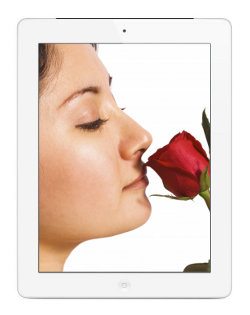That which we call a rose
 UPDATE: Since I wrote this Apple have changed the name of the iPad in question to the “iPad with WiFi + Cellular” in many markets including Australia. This solves the problem neatly and reduces the following article to historical interest only.
UPDATE: Since I wrote this Apple have changed the name of the iPad in question to the “iPad with WiFi + Cellular” in many markets including Australia. This solves the problem neatly and reduces the following article to historical interest only.
You may have heard about the fuss surrounding what Apple calls “The New iPad” and what everyone else calls the “iPad 3”. One of the main issues surrounds the device’s internet connection. All versions of the new iPad can connect via WiFi and Apple calls these “WiFi models” which is fair enough. But some can also connect via mobile phone networks and Apple calls these “WiFi + 4G” and this is where the problems arise.
“WiFi + 4G” models of the iPad actually have a radio transceiver, circuitry and programming to connect to a wide range of mobile phone networks over which internet connection can be obtained. It can connect to GSM (otherwise known as second generation or 2G networks) and EDGE (2.5G) on 850, 900, 1800 & 1900 MHz. It can connect to UMTS, HSPA, HSPA+ & DC-HSDPA (all known as 3G networks) on 850, 900, 1900 & 2100 MHz. And finally it an also connect to LTE (one kind of 4G network) on 700 & 2100 MHz only. This is great for users in the United States where popular carriers such as Verizon and AT&T use these bands for LTE/4G services since these services deliver really fast data.
Unfortunately in Australia and many other countries 4G networks (where they exist at all) are not on these same frequencies. The only available 4G network in Australia is provided by Telstra on 1800 MHz and therefore the new iPad can’t use it. Instead a new iPad in Australia connected to Telstra will connect to their 3G network known as NextG (a Telstra brandname) on 850MHz.
Because of this consumer rights advocates and the Australian Competition and Consumer Commission (the ACCC) have slammed Apple for marketing the “WiFi + 4G” model in Australia under that name, claiming it’s unfair to consumers to sell a product with 4G in the name even though it can’t connect to any 4G networks in the country. Apple, of course, take a different view. They have agreed to notify some customers about the issue, to offer refunds to some who may have been misled and to put up signage clarifying that the device can’t connect to “current Australian 4G LTE networks”. But the controversy doesn’t end here.
Although Apple’s Australian website now makes less mention of the 4G feature and carries disclaimers explaining the issue, when you click through to buy the new iPad you are still asked to choose the “WiFi” or the “WiFi + 4G” model. As a result the ACCC continues to pursue Apple over this and Apple in return have made some curious comments. One of these, according to media reports, is that various Australian 3G networks “are 4G networks in accordance with accepted industry and regulatory use of the descriptor ‘4G'”. But do we accept that a 4G network by any other name would be as fast? Why does the name matter?
I believe one of the fundamental problems is that we don’t have a good, short, generic term for a fast mobile internet connection. We got in the habit of calling such connections “3G” when that was the fastest there was. Now we have “4G” starting to appear, but it’s not universal which leads to problems like Apple’s “iPad with WiFi + 4G”. There just isn’t a name as short and easy for Apple to change it to. Even the term “mobile broadband”, which is about as succinct as it gets, is too long and unwieldy. Also the word “broadband” has so little meaning that it is next to useless.
If there was such a term maybe Apple would be pleased to use it. After all the “iPad with WiFi + 4G” can also connect to many fast (and slower) networks that aren’t 4G as you can see from the list above.
“3G” and “4G” are adjectives describing the mobile data connection, however they have come to be used as the name for the connection itself. I’m sure those who study language have a name for this phenomenon. We need a new, really short, catchy name for a mobile data or internet connection. If you have one send it to Apple and save everyone a whole lot of trouble. (And deny a few lawyers that bigger yacht they had their eyes on.)
GC